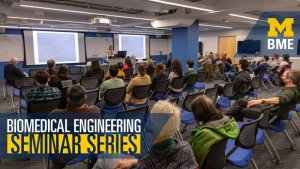Presented By: Biomedical Engineering
Biomedical Engineering Seminar Series
"Designing polymeric nanoparticles for nucleic acid delivery," with Dr. Alexandra Piotrowski-Daspit

Abstract:
The primary barrier for clinical translation of nanomedicines remains delivery to target tissues in vivo. Upon intravenous (IV) administration, vehicles encounter extracellular and intracellular barriers. It is also unclear how NP design features impact physiological interactions with biological systems, highlighting the need for studies that elucidate these structure-function relationships. In this seminar, I will describe our work on developing polymeric nanoparticles (NPs) to deliver therapeutic nucleic acids to a variety of tissues following systemic IV administration. We found that gene therapy can be significantly enhanced using a new class of polymeric vehicles consisting of poly(amine-co-ester) (PACE) polymers that are designed for safe and effective nucleic acid delivery. We have also developed tools to study nanomaterial-biology interactions in animal models. I will describe our robust high-throughput quantitative microscopy-based platform to standardize and accelerate the analysis of circulation half-life and biodistribution of nanomedicines to facilitate pre-clinical screening in vivo. This tool, alongside the development of novel polymeric carriers, can be used to study the structure-function relationships that guide the physiological fate of NPs in order to rationally design more effective delivery vehicles for future applications.
Bio:
Dr. Alexandra S. Piotrowski-Daspit, Ph.D. is an Assistant Professor of Biomedical Engineering and Internal Medicine – Pulmonary and Critical Care Medicine Division at the University of Michigan. Dr. Piotrowski-Daspit received her bachelor’s degree in Chemical-Biological Engineering and Biology from the Massachusetts Institute of Technology (MIT) and her Ph.D. in Chemical & Biological Engineering from Princeton University. She trained as a postdoctoral fellow at Yale University, and has received funding from the NIH (NHLBI K99/R00 Pathway to Independence Award) and the Cystic Fibrosis Foundation (Postdoc-to-Faculty Transition Award) to support her interdisciplinary research in chemical/biomedical engineering, biomaterials, genetics, and drug delivery to develop therapeutic strategies to treat hereditary disorders with a focus on lung diseases.
The primary barrier for clinical translation of nanomedicines remains delivery to target tissues in vivo. Upon intravenous (IV) administration, vehicles encounter extracellular and intracellular barriers. It is also unclear how NP design features impact physiological interactions with biological systems, highlighting the need for studies that elucidate these structure-function relationships. In this seminar, I will describe our work on developing polymeric nanoparticles (NPs) to deliver therapeutic nucleic acids to a variety of tissues following systemic IV administration. We found that gene therapy can be significantly enhanced using a new class of polymeric vehicles consisting of poly(amine-co-ester) (PACE) polymers that are designed for safe and effective nucleic acid delivery. We have also developed tools to study nanomaterial-biology interactions in animal models. I will describe our robust high-throughput quantitative microscopy-based platform to standardize and accelerate the analysis of circulation half-life and biodistribution of nanomedicines to facilitate pre-clinical screening in vivo. This tool, alongside the development of novel polymeric carriers, can be used to study the structure-function relationships that guide the physiological fate of NPs in order to rationally design more effective delivery vehicles for future applications.
Bio:
Dr. Alexandra S. Piotrowski-Daspit, Ph.D. is an Assistant Professor of Biomedical Engineering and Internal Medicine – Pulmonary and Critical Care Medicine Division at the University of Michigan. Dr. Piotrowski-Daspit received her bachelor’s degree in Chemical-Biological Engineering and Biology from the Massachusetts Institute of Technology (MIT) and her Ph.D. in Chemical & Biological Engineering from Princeton University. She trained as a postdoctoral fellow at Yale University, and has received funding from the NIH (NHLBI K99/R00 Pathway to Independence Award) and the Cystic Fibrosis Foundation (Postdoc-to-Faculty Transition Award) to support her interdisciplinary research in chemical/biomedical engineering, biomaterials, genetics, and drug delivery to develop therapeutic strategies to treat hereditary disorders with a focus on lung diseases.